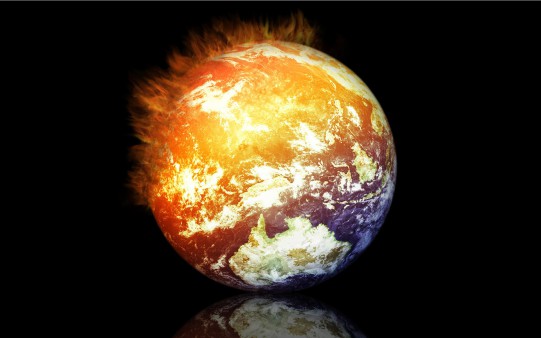
As the world burns
Amid all the foam and froth in Washington surrounding last week’s forced resignation of Eric Shinseki as head of the Veterans Administration, another more momentous controversy was percolating just under the surface, one that could have consequences for the fate of the planet and all living things.
The Obama administration’s Environmental Protection Agency (EPA) will soon be imposing a 30 percent cut in emissions from coal-fired energy plants. Republicans, along with a few conservative, coal-state Democrats, are fighting mad.
The administration says the cuts are needed to slow down the pace of global warming while the coal interests and the politicians who shill for them, such as Representative Mike Enzi of Wyoming (a major coal producing state) claim that 800,000 jobs will be lost if the cut is implemented.
One could argue that such a loss of jobs would be very harmful in a still-sluggish economy. One could, if one’s intention was to mislead the public. The 30 percent cut in emissions is to be phased by 2030!
Similarly, the regulations belie the GOP’s standard arguments about the tyranny of federal controls by incorporating a high degree of flexibility, allowing the states to meet the 30 percent goal in a number of ways, including market-based solutions.
Yet the Republicans are not buying it. They seem more inclined to drone on about the sanctity of free enterprise while Washington burns and Miami drowns.
It is useful to note that the Obama goal of a 30 percent cut is a very modest one indeed. Most scientists think much more radical reductions in greenhouse gases are needed now just to slow the pace of global warming. Some believe the only way out is to close all coal plants within the next decade or earlier.
The coal coalition – coal companies, utilities, states, and others who make money from coal – have several good reasons to cry holy hell. In the last few years in the United States, the percentage of electricity generated by coal has notably decreased as the supply of natural gas has increased and its price has dropped. Thus, apart from new government regulations, coal in the United States is a declining industry.
Moreover, as evidence keeps piling up about the harm global climate change is already doing, the viability of the dirtiest fuel is bound to decrease. For instance, although it is not yet known what percentage of the phenomenon is attributable to climate change, just last week a team of researchers announced that the current rate of species extinction is many times what was previously thought.
Why has the United States and almost the entire world done so little so far in the face of the clear and present danger of climate change? Reason, science, and humanitarian concerns have little chance when pitted against powerful political and economic interests – at least in the short run. In the long run even the most powerful institutions sometimes have had to yield to evidence. The Catholic Church won the first round with Galileo. We know how that fight ultimately turned out.
The difference, and the grave problem for humanity, is that on this there is virtually no time. In fact, in the view of many scientists, we have already run out of time. Some of the processes that are leading to sea-level rise and a warmer planet are essentially irreversible. And things could get worse. When you combine the recalcitrance of the United States with China’s coal-fueled sprint to catch up with the West and provide a higher standard of living for its people, you have a formula for disaster.
The human species will survive, but at what cost to the things that make life worth living?
Finally, the most bitter irony and the most shameful reason for the lack of urgency regarding global warming is that the rich countries, which for centuries have contributed greatly to the build-up of greenhouse gases in the atmosphere, will be spared the worst ravages while those poor areas of the world which have done the least damage will feel the full brunt of the calamity.

